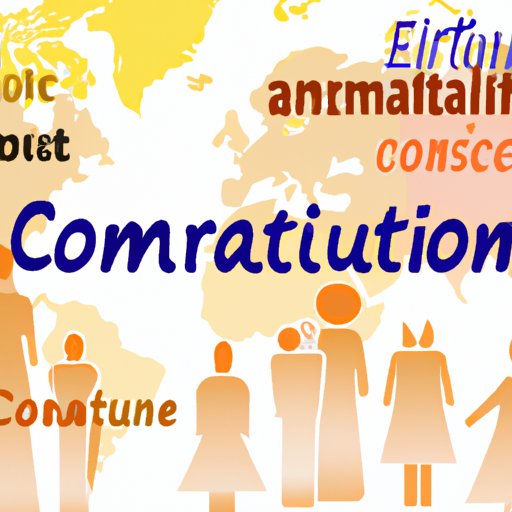Introduction
Cultural identity is an important concept that refers to the identity of a group or culture, in terms of its shared values, beliefs and customs. It is shaped by a variety of factors, including history, language, ethnicity, geography, and religion. Cultural identity plays a key role in shaping our lives, from our sense of self and our relationships with others to our daily activities and habits.
Examining Different Cultural Identities
Cultural identities vary greatly from one place to another, and even within a single country. For example, in India, there are many different cultures, languages, and religions, each with their own unique set of values and customs. In the United States, there are numerous ethnic and racial groups, each with their own distinct cultural identities.
Globalization has had a significant impact on cultural identities. As goods, services, and ideas move more freely across borders, cultures become increasingly intertwined. This can lead to a blending of cultures, as people adopt elements of other cultures into their own. However, it can also lead to the erosion of cultural identities, as local customs and traditions are replaced by global norms.
Religion also plays an important role in shaping cultural identities. In many cultures, religious beliefs and practices are deeply intertwined with everyday life. Religion provides a sense of shared identity and purpose, as well as a moral framework for living. Religion can also be a source of tension between different cultural identities, as different religious beliefs can clash with one another.

Challenges Faced by Minority Cultural Identities
Minority cultural identities often face unique challenges. These include discrimination, marginalization, and exclusion. Minorities may also struggle to maintain their cultural identities in the face of dominant cultures or ideologies. For example, indigenous peoples around the world have struggled to maintain their traditional ways of life in the face of colonization and assimilation.
There are a number of strategies that can be used to address these challenges. These include promoting diversity and inclusion, educating people about cultural differences, and supporting minority-led initiatives. Governments can also play an important role in protecting and promoting minority cultural identities by enacting laws and policies that support the rights of minority groups.
Passing Down Cultural Identities Through Generations
Cultural identities are often passed down from generation to generation. This can be done in a variety of ways, such as through storytelling, rituals, and ceremonies. Parents and other family members can also play an important role in passing down cultural identities by teaching children about their culture’s values, beliefs, and customs.
Preserving cultural identities is important for a number of reasons. It helps to maintain a sense of shared identity and community, and it can also provide a source of pride and connection to one’s roots. Additionally, preserving cultural identities can help to foster understanding and respect between different cultures.
Conclusion
In conclusion, cultural identity is an important concept that shapes our lives in many ways. Cultural identities can vary greatly from one place to another, and are impacted by globalization and religion. Minority cultural identities often face unique challenges, but there are strategies that can be used to address them. Finally, cultural identities are often passed down from generation to generation, and preserving them is important for fostering understanding and respect between different cultures.
(Note: Is this article not meeting your expectations? Do you have knowledge or insights to share? Unlock new opportunities and expand your reach by joining our authors team. Click Registration to join us and share your expertise with our readers.)
